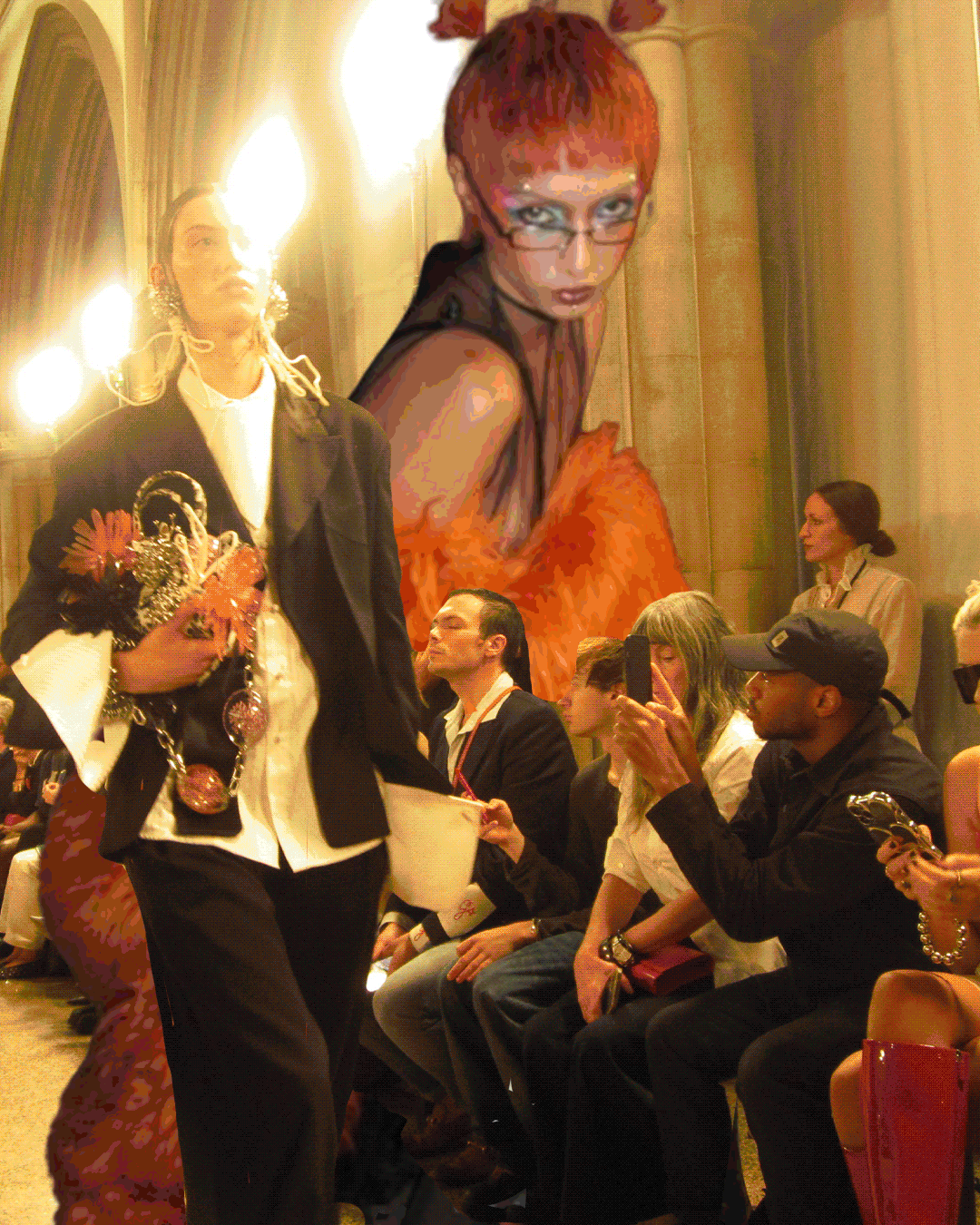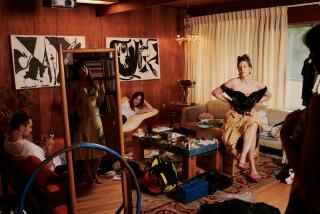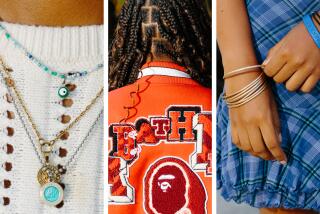Will we wear jeans in the future? The costume designer for ‘Avenue 5’ has thoughts
Unisex swimwear. Accessible jumpsuits. Snazzy track suits. All of it might just be the future of fashion. At least that’s the way Suzie Harman, costume designer behind HBO’s “Avenue 5,” sees it.
Set 40 years in the future, “Veep” showrunner Armando Iannucci’s space tourism comedy, which was just renewed for a second season, delivers one outlandish look after another with an aesthetic that Harman calls “bonkers but chic.” Beyond custom-making most of the ensemble cast’s wardrobe, Harman was tasked with designing looks for the ship’s crew and passengers.
“It’s almost like creating Virgin Galactic,” Harman said during a recent phone interview from London. “I remember the first day that the extras came onto set ... Armando’s eyes popped out of his head.” She said her agent told her, “I feel like I just came from a trip — like an acid trip. It’s absolutely crazy.”
From Josh Gad’s Donald Trump Jr.-meets-Billy McFarland-inspired ensembles to Lenora Crichlow’s wearable, Off-White-influenced jumpsuits, here’s everything you need to know about the show’s colorful costumes.
Herman Judd (played by Josh Gad)’s eccentric look was influenced by “Back to the Future Part II,’’ Donald Trump Jr. and the Fyre Festival’s Billy McFarland. “We referenced oligarchs, politicians, sons of politicians and the wealthy and how when they get it wrong — it’s really wrong,” Harman said. “Then we pushed it further. [Gad’s character] would wear a shirt but he’d wear it with a track suit. And the track suit wouldn’t be a jersey. It would be the most expensive track suit trimmed with rare python.”
Harman said McFarland was a particularly influential figure for Gad. “He came up quite a lot,” she said. “That was one thing [Josh] said, ‘What if Billy McFarland had actually succeeded in his Fyre Festival and he then set up a space touring business? And he had stylists around him that were going, ‘You should wear this and you should wear that, and at no point would anyone say to him, Billy, you look like an idiot.’ That’s sort of where we got to with Josh’s character Judd. It’s like nobody had ever said, ‘Maybe just wear a suit.’ It was always going a bit further. He’s the boss that everyone can kind of ridicule in a way.”
Harman referenced Italian brand Billionaire when nailing down the exact aesthetic. “Their stuff is just so over the top,” Harman said. “So we took reference from them a little bit and then mixed it in with a little bit of Donald Trump Jr.”
Other famous faces provided additional inspiration for Hugh Laurie and Rebecca Front’s characters, Ryan Clark and Karen Kelly, respectively. “Our main reference [for Hugh] was Sean Connery from ‘The Hunt for Red October,’” Harman said, adding that Front’s character, Karen Kelly, is influenced by a certain famous reality star.
“We sort of based her a bit on Mama Kardashian,” Harman said, referencing Kris Jenner. “That was Rebecca’s key thing. As you watch, you’ll see little references of that.”
Karen’s creamy tracksuit is from Italian brand Pinko while her other looks are custom-made and reflect her evolving position on the ship. “She definitely starts power dressing and thinking she’s the boss,” Harman said. “There’s definitely a strength in her look.”
Billie McEvoy (Lenora Crichlow) rocks one covetable jumpsuit after another. Although Harman’s crew custom-made all of Crichlow’s character’s suits, the costume designer acknowledged the design’s contemporary appeal. “Throughout the whole thing, one of the major influences was Off-White and high-end luxury sportswear,” she said, adding that they accessorized Billie with an airplane belt buckle from the Virgil Abloh brand.
“It felt right for her,” Harman said, imagining Billie’s wardrobe backstory. “She might have had it for 40 years or it was her mum’s.” Harman also pulled jumpsuit inspiration from a vintage Japanese embroidered boiler suit a colleague found in Tokyo. “One of my buyers is the jumpsuit queen,” Harman said. “She has hundreds of them. She brought this one in, and it had such beautiful pleating detail on it.”
If you’re looking for one of your own, Harman advised hitting up your local vintage shop. “There are some amazing vintage boiler suits out there,” she said. “Tie a belt around the middle, roll up the sleeves and wear it with confidence.”
The floral wardrobe of Mia (Jessica St. Clair) was custom-made in collaboration with British swimwear label Paolita. “They had loads of wonderful fabrics, and we asked them to create some specific ones for her,” Harman said of Mia’s look, which was meant to stand out from the drab wardrobe of her husband (Kyle Bornheimer) because their marriage is on the rocks. “We wanted her to look like she’s on the up and he can’t move with her,” Harman said. “She’s having an affair, and she’s feeling really good about herself. ... She’s feeling great, and it’s just like, ‘Keep up. I’m looking good. You’ve got to watch it, mate.’”
With recent fashion shows featuring numerous gender-fluid looks, Harman believes unisex bathing suits could be the future. “In one of the episodes, we have a man and a woman wearing identical swimwear,” she said. “There are no men in shorts or women in full bikinis.” She also considered gender fluidity when dressing the show’s extras. “We did a bit of that as well, especially in the crowd, the background artists. We’d have some more gender-fluid looks in there,” she said. “It’s not to make a big deal of it. It’s just that’s the way that it would be. We’re just at the beginning of all that. So in 40 years’ time, who knows? I think we would have liked to have taken it further, but [we had] restrictions on shooting and everything. I think we shopped and fitted something like 2,000 extras.”
‘Avenue 5,’ from ‘Veep’ creator Armando Iannucci, and ‘Medical Police,’ from the ‘Childrens Hospital’ team, are expertly acted and funny enough to keep you going.
Jeans will still be as relevant in 40 years as they are today. “Forty years ago we wore jeans,” Harman said. “We’re wearing jeans now and we’ll wear them in the future.” She explained she took a more contemporary approach to the show’s aesthetic. “We were never trying to do sci-fi or futuristic. It’s only 40 years into the future,” she said, explaining the costume design process began with considering what people currently wear on cruise ships. “We were looking at the people now, the hipsters, the fashionites now. They’ll be the ones in their 80s going on this cruise. So what are they wearing now? And did they stay in their fashion? You get your look when you’re in your 20s and you sort of stick with it through your whole life. We started looking at catwalk fashion now and working that into [it].”
As the story unravels, some characters (and their wardrobes) will follow. “It gets a bit crazier,” Harman said of the remaining episodes of the first season. “Certain characters start to lose it a bit, and they become more disheveled. … I don’t want to give away too much. … At the beginning of episode 1 through episode 9, they’ve all gone through something. And there’s a huge transition with them, but I can’t say what that is.”
More to Read
Sign up for The Wild
We’ll help you find the best places to hike, bike and run, as well as the perfect silent spots for meditation and yoga.
You may occasionally receive promotional content from the Los Angeles Times.










